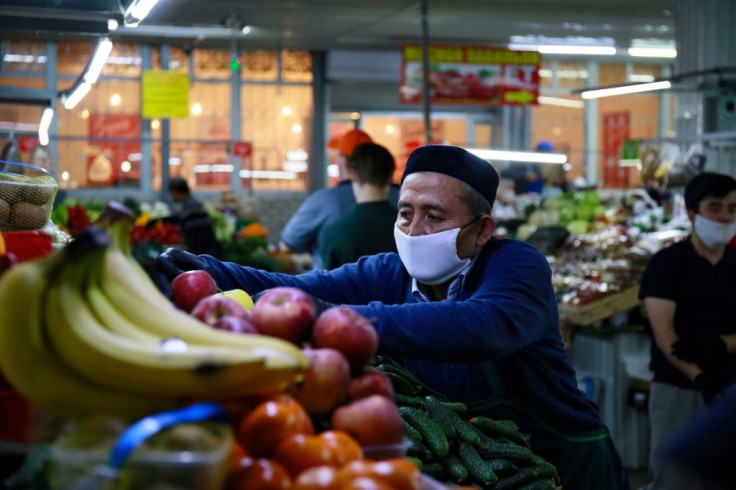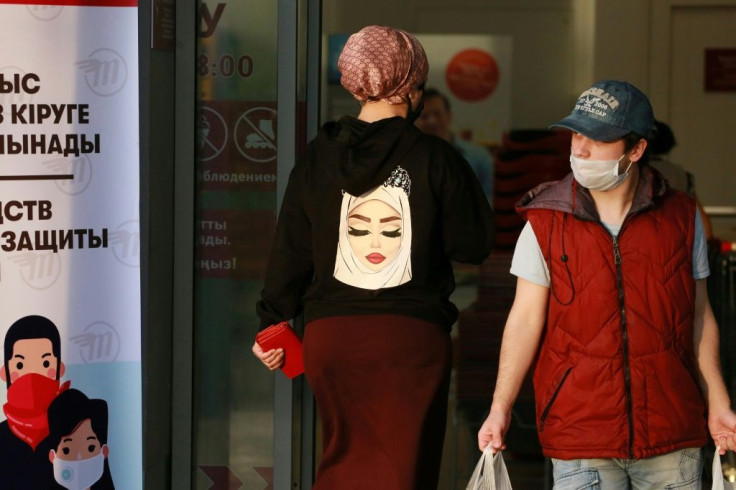Kazakhstan Sees Coronavirus 'Perfect Storm' Looming Over Economy
Maria Sakulinskaya's textile business was expanding just as the coronavirus pandemic hit Kazakhstan, striking at the heart of the ex-Soviet nation's brittle economy.
A steady flow of work as a lone entrepreneur had put her in the position to offer contracts to three seamstresses.
On the horizon was one of her busiest seasons -- sewing dresses for school-leaving ceremonies.
But by late March, all non-essential businesses in Kazakstan's second city, Almaty, including Sakulinskaya's had been ordered closed by authorities anxious to contain the coronavirus.

The schools that were key customers were shuttered too.
"This quarantine has blown me out," said Sakulinskaya, estimating her monthly income would have tripled to $1,000 if everything had gone to plan.
"I am sitting at home without anything. Our only lifelines have come from the state," she told AFP.

Sakulinskaya is one of over four million Kazakh citizens to receive a government handout of roughly $95 after losing work due to the lockdown.
The Central Asian country of 18 million has registered over 4,000 coronavirus cases and 27 deaths.
The payments, which began landing in bank accounts earlier this month, are among anti-crisis measures introduced by authorities reeling from the virus-hit economy and a precipitous fall in global prices for the country's key crude oil export.

This combination, which Kazakstan's former president and defacto decider Nursultan Nazarbayev labelled a "perfect storm", has seen the International Monetary Fund and the World Bank predict a recession in Central Asia's largest economy this year.
While Sakulinskaya is grateful for the help, not everyone is happy with the government's virus response.
Nazarbayev last month personally oversaw the creation of a fund called Birgemiz ("We're Together") to source private contributions for the coronavirus fight.
But soon after it was set up, local media reported that state officials were being forced to contribute.
An employee of the geology and natural resources ministry told AFP his superior had asked him and his colleagues to give a day's salary, or between 8,000 and 12,000 tenge ($18-28).

"They asked specialists at the ministry to do the same, but they refused," said the staffer who requested anonymity. "So they only had to pay 3,000 tenge ($7)."
Nazarbayev's office has condemned involuntary contributions, stressing that the call was aimed primarily at big businesses.
But some of these donations have been met with scepticism in a country known for nepotism and corruption.
A fund attached to the country's largest bank, Halyk, which is controlled by Nazarbayev's daughter Dinara Kulibayeva and her husband Timur Kulibayev, donated over $10 million to the Birgemiz fund.
But commentators on social media pointed out that the sum was a sixth of the value of a Swiss chateau Kulibayeva was reported to have purchased last year.
Kazakhstan is no stranger to economic crises.
Oil price shocks in 2009 and 2014 pummelled the economy and fuelled frustration with a regime which last year saw historic change as Nazarbayev made way for ally Kassym-Jomart Tokayev after three decades at the helm.
With oil prices hovering around $22 per barrel and with the service and manufacturing sectors halted, the situation today is more reminiscent of the Soviet collapse that spawned national independence in 1991, said economic analyst Tulegen Askarov.
"(We are witnessing) the collapse of habitual economic linkages," Askarov told AFP. "Perhaps also social and cultural connections."
The irony, which long-suffering entrepreneurs like Sakulinskaya feel bitterly, is that Kazakhstan was beginning to look as if it had turned a corner following its last economic slump.
Only in February, international investment bank Renaissance Capital crowned the country its "top pick for equity investors in the frontier markets" of Europe, Africa and the Middle East.
It cited 4.5 percent GDP growth in 2019 -- a six-year high -- and growth projections of 4.3 percent for 2020.
"The coronavirus crisis could add uncertainty," Renaissance Capital cautioned at the time, saying the "direct contagion risk remains muted."
For Sakulinskaya, however, the risk materialised and the uncertainty looms large.
"All the effort I put in has come to nothing. What does the future hold? I just don't know."
© Copyright AFP 2024. All rights reserved.





















